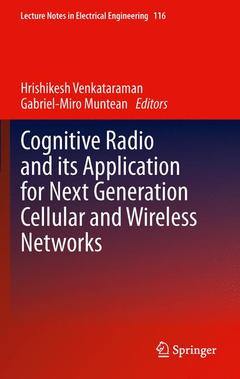Description
Cognitive Radio and its Application for Next Generation Cellular and Wireless Networks, 2012
Lecture Notes in Electrical Engineering Series, Vol. 116
Coordinators: Venkataraman Hrishikesh, Muntean Gabriel-Miro
Language: English
Subjects for Cognitive Radio and its Application for Next Generation...:
Publication date: 05-2014
412 p. · 15.5x23.5 cm · Paperback
Publication date: 04-2012
412 p. · 15.5x23.5 cm · Hardback
Description
/li>Contents
/li>Biography
/li>Comment
/li>
This book provides a broad introduction to Cognitive Radio, which attempts to mimic human cognition and reasoning applied to Software Defined Radio and reconfigurable radio over wireless networks. It provides readers with significant technical and practical insights into different aspects of Cognitive Radio, starting from a basic background, the principle behind the technology, the inter-related technologies and application to cellular and vehicular networks, the technical challenges, implementation and future trends. The discussion balances theoretical concepts and practical implementation. Wherever feasible, the different concepts explained are linked to application of the corresponding scheme in a particular wireless standard.
This book has two sections: the first section begins with an introduction to cognitive radio and discusses in detail various, inter-dependent technologies such as network coding, software-based radio, dirty RF, etc. and their relation to cognitive radio. The second section deals with two key applications of cognitive radio ? next generation cellular networks and vehicular networks. The focus is on the impact and the benefit of having cognitive radio-based mechanisms for radio resource allocation, multihop data transmission, co-operative communication, cross-layer solutions and FPGA-level framework design, as well as the effect of relays as cognitive gateways and real-time, seamless multimedia transmission using cognitive radio.
Dr. Hrishikesh Venkataraman is a senior researcher and Enterprise Ireland (EI) Principal Investigator with Performance Engineering Laboratory at the Irish national research center – The RINCE Institute, in Dublin City University (DCU), Ireland. He obtained his Ph.D. from Jacobs University Bremen, Germany, in 2007 for his research on wireless cellular networks. He obtained his master's degree from Indian Institute of Technology (IIT) Kanpur, India, in 2004 and did his master's thesis from Vodafone Chair for Mobile Communications, Technical University Dresden, Germany, from 2003 to 2004 under the Indo-German DAAD Fellowship. His research interests include mobile multimedia, wireless communications and energy in wireless. Dr. Venkataraman has published more than 40 papers in journals, international conferences and book chapters and has won a best paper award in World Congress on Engineering and Computer Science in University of Berkeley, USA, in October 2009. Currently, Dr. Venkataraman is an Executive Editor of European Transactions on Telecommunications (ETT) and is a founding member of UKRI chapter of IEEE Vehicular Technology Society.
Dr. Muntean has established a strong track record in the area of performance-aware data communications in heterogeneous network environments. Dr. Muntean is Director of the Network Innovations Centre of the RINCE Research Institute, co-Director of the Dublin
City University (DCU) Performance Engineering Laboratory, a top Irish research laboratory which has a state-of-the-art facility in the DCU Engineering building, and Lecturer with the School of Electronic Engineering at DCU, Ireland. Dr. Muntean has successfully supervised five Ph.D. and four master's research students and is currently leading a team of 15 postgraduate and postdoctoral researchers. Dr. Muntean has been principal investigator or collaborator on many Enterprise Ireland, Science Foundation Ireland and Irish Research Council forScience Engineerin




